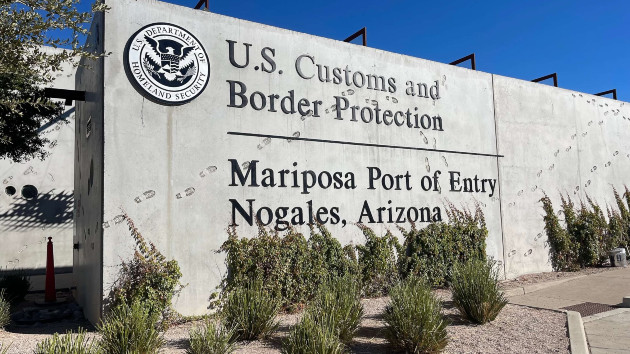
(NOGALES, Ariz.) -- Senior government officials are concerned that Congress may not pass enough funding to secure the border, as federal authorities work under immense pressure to stop illegal narcotics smuggling.
ABC News took an exclusive look at ground zero for the fight against one particularly deadly drug: fentanyl. Southern Arizona has become a massive corridor for trafficking the synthetic opioid with nearly half of all border seizures occurring at federal checkpoints in the state.
At the Mariposa Port of Entry in Nogales, Arizona, U.S. Customs and Border Protection Acting Commissioner Troy Miller told ABC News his front-line officers are in dire need of more technology, manpower and the tools to improve incoming cargo detection.
"The headline here is we need additional resources to continue our fight against fentanyl," Miller said.
ABC News observed the critical balancing act performed by customs officers responsible for catching drugs while facilitating the flow of legitimate commercial trade -- about $4 trillion worth annually.
"It's very challenging," Miller said. "It's certainly very challenging as we see the seizures go up year after year. But I can say, as we organize and we're going after these ruthless criminals that are killing American citizens, all of our partners are focused on this particular fight."
Using X-ray scanning technology, drug sniffing dogs and classic detective experience, CBP is seizing 860% more fentanyl compared to 2019.
But with more than 100,000 people dying from drug overdoses last year, officials say they believe there is more work to be done. Fentanyl has been linked to the majority of overdose deaths in the U.S., according to the Centers for Disease Control and Prevention. The synthetic opioid is 50 times stronger than heroin and 100 times stronger than morphine, according to the CDC.
The Biden administration has requested $14 billion from Congress for border security as part of a larger supplemental funding proposal that ties together aid for Israel and Ukraine. But Republicans are refusing to offer support unless the Biden administration can reduce the historically high levels of illegal migration seen in recent years.
"The continuing chaos at the Southwest border is ultimately a policy-driven crisis, not a resource-driven one," Republican Rep. Mark Green, chairman of the House Homeland Security Committee, said in a statement. "I will not support a dime of this request until President [Joe] Biden and Secretary [Alejandro] Mayorkas take substantive steps to reverse the policies that have sparked and maintained this crisis."
The Biden administration continues to walk a fraught line between tough enforcement measures at the border and providing lawful humanitarian support for migrants. Complicating the effort is the work of cartel organizations that operate internationally.
Across the border from Nogales, the notorious Sinaloa cartel unofficially controls much of the territory, Miller said. Law enforcement officers say they believe the same criminal organizations that route drugs up to the border are also responsible for human smuggling.
"I think right now it is extremely important we continue to go after the transnational criminal organizations that are trafficking fentanyl, that are taking advantage of the world's most vulnerable people and making money off those individuals," Miller said.
The agency is working to install 34 new X-ray scanning machines to help catch and seize illegal drugs coming in to the U.S. There are plans to install more than 150 with enough funding.
Further complicating law enforcement's efforts is a looming government shutdown. While much of the border work force will be required to work without pay, concerns about the impact on morale and recruitment efforts remain.
"I'm not in the business of predicting anything," Miller said. "The men and women of U.S. Customs and Border Protection are going to be working whether there's a government shutdown or not, and they deserve to be paid."